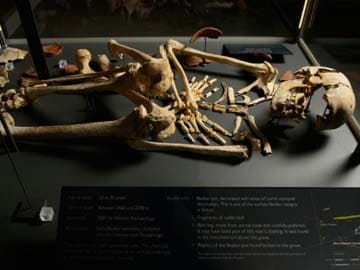
The skeleton of a man between 2460 and 2290 BC, during the early Bronze Age, and was buried near the world heritage prehistoric monument of Stonehenge.
London:
Scientists say they have discovered human footprints in England that are at least 800,000 years old - the most ancient found outside Africa, and the earliest evidence of human life in Northern Europe.
A team from the British Museum, the Natural History Museum and the University of London uncovered imprints from up to five individuals in ancient estuary mud at Happisburgh on the country's east coast.
British Museum scientist Nick Ashton says the prints are "a tangible link to our earliest human relatives."
The scientists say the humans who left the footprints may have been related to Homo antecessor, or "pioneer man," whose fossilized remains have been found in Spain and who died out 800,000 years ago.
The find was announced Friday, and published in the journal PLOS ONE.
A team from the British Museum, the Natural History Museum and the University of London uncovered imprints from up to five individuals in ancient estuary mud at Happisburgh on the country's east coast.
British Museum scientist Nick Ashton says the prints are "a tangible link to our earliest human relatives."
The scientists say the humans who left the footprints may have been related to Homo antecessor, or "pioneer man," whose fossilized remains have been found in Spain and who died out 800,000 years ago.
The find was announced Friday, and published in the journal PLOS ONE.
Track Latest News Live on NDTV.com and get news updates from India and around the world

